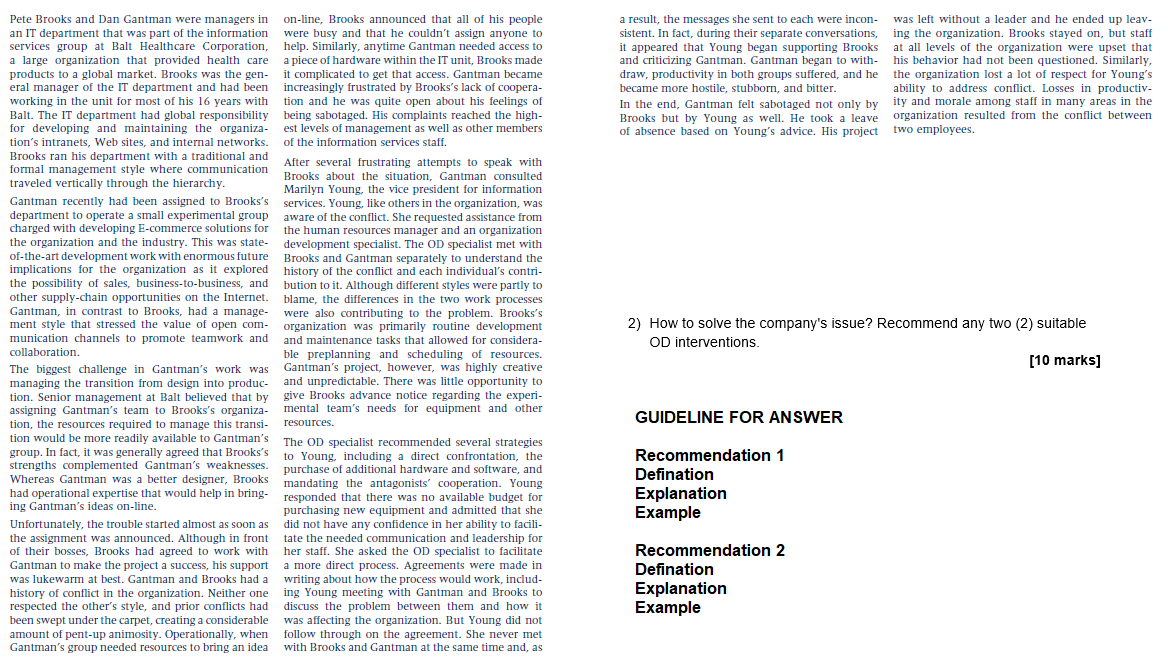Answered step by step
Verified Expert Solution
Question
1 Approved Answer
Pete Brooks and Dan Gantman were managers in an IT department that was part of the information services group at Balt Healthcare Corporation, a

Pete Brooks and Dan Gantman were managers in an IT department that was part of the information services group at Balt Healthcare Corporation, a large organization that provided health care products to a global market. Brooks was the gen- eral manager of the IT department and had been working in the unit for most of his 16 years with Balt. The IT department had global responsibility for developing and maintaining the organiza- tion's intranets, Web sites, and internal networks. Brooks ran his department with a traditional and formal management style where communication traveled vertically through the hierarchy. Gantman recently had been assigned to Brooks's department to operate a small experimental group charged with developing E-commerce solutions for the organization and the industry. This was state of-the-art development work with enormous future implications for the organization as it explored the possibility of sales, business-to-business, and other supply-chain opportunities on the Internet. Gantman, in contrast to Brooks, had a manage- ment style that stressed the value of open com- munication channels to promote teamwork and collaboration. The biggest challenge in Gantman's work was managing the transition from design into produc- tion. Senior management at Balt believed that by assigning Gantman's team to Brooks's organiza- tion, the resources required to manage this transi- tion would be more readily available to Gantman's group. In fact, it was generally agreed that Brooks's strengths complemented Gantman's weaknesses. Whereas Gantman was a better designer, Brooks had operational expertise that would help in bring- ing Gantman's ideas on-line. Unfortunately, the trouble started almost as soon as the assignment was announced. Although in front of their bosses, Brooks had agreed to work with Gantman to make the project a success, his support was lukewarm at best. Gantman and Brooks had a history of conflict in the organization. Neither one respected the other's style, and prior conflicts had been swept under the carpet, creating a considerable amount of pent-up animosity. Operationally, when Gantman's group needed resources to bring an idea on-line, Brooks announced that all of his people were busy and that he couldn't assign anyone to help. Similarly, anytime Gantman needed access to a piece of hardware within the IT unit, Brooks made it complicated to get that access. Gantman became increasingly frustrated by Brooks's lack of coopera- tion and he was quite open about his feelings of being sabotaged. His complaints reached the high- est levels of management as well as other members of the information services staff. After several frustrating attempts to speak with Brooks about the situation, Gantman consulted Marilyn Young, the vice president for information services. Young, like others in the organization, was aware of the conflict. She requested assistance from the human resources manager and an organization development specialist. The OD specialist met with Brooks and Gantman separately to understand the history of the conflict and each individual's contri- bution to it. Although different styles were partly to blame, the differences in the two work processes were also contributing to the problem. Brooks's organization was primarily routine development and maintenance tasks that allowed for considera- ble preplanning and scheduling of resources. Gantman's project, however, was highly creative and unpredictable. There was little opportunity to give Brooks advance notice regarding the experi- mental team's needs for equipment and other resources. The OD specialist recommended several strategies to Young, including a direct confrontation, the purchase of additional hardware and software, and mandating the antagonists' cooperation. Young responded that there was no available budget for purchasing new equipment and admitted that she did not have any confidence in her ability to facili- tate the needed communication and leadership for her staff. She asked the OD specialist to facilitate a more direct process. Agreements were made in writing about how the process would work, includ- ing Young meeting with Gantman and Brooks to discuss the problem between them and how it was affecting the organization. But Young did not follow through on the agreement. She never met with Brooks and Gantman at the same time and, as a result, the messages she sent to each were incon- sistent. In fact, during their separate conversations, it appeared that Young began supporting Brooks and criticizing Gantman. Gantman began to with draw, productivity in both groups suffered, and he became more hostile, stubborn, and bitter. In the end, Gantman felt sabotaged not only by Brooks but by Young as well. He took a leave of absence based on Young's advice. His project was left without a leader and he ended up leav- ing the organization. Brooks stayed on, but staff at all levels of the organization were upset that his behavior had not been questioned. Similarly, the organization lost a lot of respect for Young's ability to address conflict. Losses in productiv- ity and morale among staff in many areas in the organization resulted from the conflict between two employees. 2) How to solve the company's issue? Recommend any two (2) suitable OD interventions. GUIDELINE FOR ANSWER Recommendation 1 Defination Explanation Example Recommendation 2 Defination Explanation Example [10 marks]
Step by Step Solution
There are 3 Steps involved in it
Step: 1

Get Instant Access to Expert-Tailored Solutions
See step-by-step solutions with expert insights and AI powered tools for academic success
Step: 2

Step: 3

Ace Your Homework with AI
Get the answers you need in no time with our AI-driven, step-by-step assistance
Get Started


